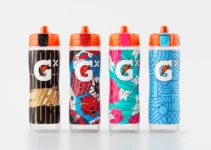Let’s go get some cookies has to be one of the happiest phrases you can utter to kids or even adults with a sweet tooth. Of course, too much of everything, especially sugar, is bad, but the occasional treats are needed and won’t hurt.
However, many revered brands come in tins, and the better to preserve the quality, texture, and sweet delicacy. Statistics predict that the number of people who eat cookies in the United States will increase to 250.8 million by 2023. And given that metal tins are often the go-to packaging materials for cookie brands, a considerable number goes around yearly.
If you are concerned about the environment, you will care about the correct way to dispose of items that are famous for such high demand and consumption. Therefore, you have most certainly come to the right place if you want to know whether you can recycle cookie tins.
Can You Recycle Cookie Tins?
Yes, you can recycle cookie tins, and it is easier than ever! You can do it from your doorstep, that is, by putting it straight in the curbside recycling bin. They are made from tinplate, which are steel or iron with a layer of tin. It is entirely recyclable.
This is what gives the cookie tins their glossy appeal on the inside, but that is not all. These tin boxes are excellent at keeping air out. They will not compress easily either, therefore protecting the cookies and keeping them whole for you to crush yourself.
One last reason cookie tins are a great choice of manufacturing equipment is their environmentally-friendly nature. They can be reused and recycled endlessly.
You can recycle cookie tins, and you should. You have two options – empty the container and clean it out properly before putting it in the recycle bin or take it to a metal recycling center or scrap yard.
If you choose a metal recycling center, it’s best to accumulate your cookie tins instead of taking them there one after the other. Pending the time they will be taken there, you can use the cookie tins to make your life easier.
We will certainly explore the crafty things you can do with cookie tins, but if you’d instead recycle them, that is also acceptable. However, you will accumulate a considerable collection of cookie tins if you only decide to get artsy with them.
What are Cookie Tins Made of?
Cookie tins are made of steel and tinplate. The primary material here is tin ore, and the beautiful designs you see on your favorite brands today began as far back as 1877.
The semi-thick sheets of steel and tin plate used to manufacture cookie tins are pliable enough that creative imprints can be made on them. The rarity of tin, the material, makes it such that only a small amount is utilized in production, especially for cookie tins.
For instance, cookie tins contain a maximum of two percent tin. The rest of the material is a base substance, like steel. The tin is applied to prevent corrosion because, on its own, steel will not hold its weight against the elements of rust.
Fortunately, tin is recyclable; you can do it countless times. And it is readily accepted at any recycling center or scrap yard. So, manufacturing cookie tins may be sustainable for the environment, but only when you play your part by disposing of them properly.
Are Metal Cookie Tins Recyclable?
Metal cookie tins are recyclable. They are among the materials readily welcome in a recycling bin or center. You can also take them to a scrap metal recycler if that is what you prefer.
There are two types of tin materials. The first group is ferrous metals – they contain iron and steel. The other batch is the non-ferrous metals, which don’t contain alloys or other materials like iron and steel.
These items are used for packaging cookies to maintain their freshness and quality. Fortunately, your consumption of them won’t wreak havoc on the environment because metal cookie tins are recyclable.
You can recycle them limitless times. And they are accepted in virtually every recycling center or scrap yard you walk into.
Before recycling, you may be required to identify the type of cookie tin in your custody. Ferrous tins are generally more acceptable and can be determined by the attraction created by putting a magnet near them.
Regardless of the type of tin you are recycling, you will find a place to get it done. However, you must clean the container to remove items that may contaminate the materials in the recycling machine.

Are Christmas Cookie Tins Recyclable?
Yes, Christmas cookie tins are recyclable. They are made from metal or tin and steel, and the combination of these materials does not deter recyclers. If anything, recycling Christmas cookie tins is encouraged because of the myriad of things derived from its melted results.
Tin is a relatively scarce material, which means every manufacturer must use what is within their disposal well.
Christmastime is one of the most exciting periods for many of us. It is a period characterized by sharing gifts, baking cookies, and other confectioneries, and taking family pictures. If you are lucky enough, your family holds a celebration yearly where your cousins, nieces and nephews, and siblings come together after a long time. Such joy!
Aside from home-baked cookies, Christmas cookies are a special type of cookies mostly around during Christmastime. These tins are famous for their bright and attractive patterns that remind you of reindeer, snow, and your other favorite things about this period.
If you receive some Christmas cookies, you need to deal with recycling the empty container. Even if you find a use for it for a while, you will eventually need to throw it away.
Your recycling center will accept them. Regardless of the festivity attached to them, Cookie tins are generally acceptable at curbside and municipal recycling centers.
But if you don’t have those, you can take them to a scrapyard or metal recycling center.
Can You Freeze Cookies in a Metal Tin?
Yes, you can freeze cookies in a metal tin. This is one of the best methods of preservation for the long term. You don’t want to lose a batch of well-baked cookies, so freezing in a metal tin or other airtight container is a smart move.
No one likes soggy cookies, and the wet pastries certainly mean the purpose of refrigeration, which is storage and preservation, is defeated.
Cookies need to be kept away from water for obvious reasons. The moist and cold air in the refrigerator is included – not only should the cookies stay out of their reach for longer shelf life, but eating items exposed to these conditions is not ideal.
Therefore, your best bet is an airtight container. So, if you have some cookie tins, why not use them? Metal or otherwise, as long as there is no way for air and moisture to penetrate, you are good to go.
How do You Recycle Cookie Tins?
It depends on your preferred method. When it comes to cookie tins, you are so lucky that virtually every recycling center will accept them. Therefore, you may not need to stress about finding a way to dispose of your cookie tins in an environmentally friendly manner.
The first option is your recycling bin. But you must clean out the contents of the can before putting it there so that it won’t be rejected. We mean you must remove the cookie crumbs and leftover sugars in the container so it doesn’t pose a problem at the recycling center.
You must also ensure that you dry the containers, or they will not be accepted at the recycling center. If you don’t have a recycling bin in your home, consider your curbside or municipal recycling bins.
And you can take it to the recycling center yourself, and it is always safe to ask first before showing up. Use the internet to find out if that location accepts empty cookie tins.
One way to stay on the side of the environment through your disposal habits is to save the cookie tins and take them all to your desired recycling location at once.
This is a smart move for people who don’t have easy access to recycling bins.
You can also apply that method if you are choosing to recycle your cookie tins at the metal recyclers. Gather them, clean or wash them, dry them, and take them to the metal recycling center.
What Can You do With Old Cookie Tins?
There are a ton of things you can do with old cookie tins! Let’s start here, a trip back to your childhood – do you recollect opening a cookie tin only to discover sewing supplies or condiments?
Storage is the primary purpose your empty cookie tins can serve. You can use them to hold tiny equipment and tools, sewing items, or jewelry. You can also use old cookie tins for crafty things you can utilize around the home.
Your options include:
Tiered Stands
For this hack, you need two or three wood candlesticks. Any size you desire, depending on how large you want your stand to be. You also need a strong adhesive, some spray paint, and the other items you use when you want to spruce up a project.
For aesthetics, you will attach the candlestick to the bottom of one empty cookie tin, preferably a Christmas cookie tin. Then, put the bottom of the candlestick into the next cookie tin and ensure the adhesive holds them firmly in place.
Place the second candlestick on it, and you will have a tiered stand where you can place items like flowers, your keys, or small decorative bits.
Food Storage
You can also store food in an empty cookie tin. Thankfully, these containers have lids that create an airtight environment for dry and wet foods. You can put it in the refrigerator or your pantry.
Instead of investing in plastic containers for food storage, you can save money by keeping empty cookie tins and using them.
Tools Storage
You can store your baking tools in an empty cookie tin to keep them all in one place. The container is often large enough to hold items like your small measuring utensils, piping bags, and cookie cutters.
Your very Own Money Jar
Nothing is stopping you from saving money in your empty cookie jar. It has a lid you can easily open and close to put some money in. Although taking it out will also be easier.
Conclusion
Cookie tins are recyclable and quite easily, for that matter. This is because they are made from steel and tin, two materials that you can recycle over and over without diminishing the quality of products they are used to make.






